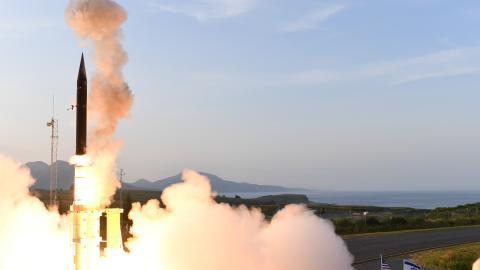Europe’s emerging rearmament is being backstopped by an unlikely source: Israel. Last week, the United States gave Israel the green light to sell its most advanced long-range missile defense system, the codeveloped Arrow 3, to Germany. At $3.5 billion, it is the largest defense deal in Israel’s history and will form a consequential part of the 19-member European Sky Shield Initiative. The Arrow 3 sale is the most important in a string of Israeli weapon sales to Europe since Russia’s full-scale invasion of Ukraine 18 months ago. Israeli officials maintain that other European countries have expressed interest in purchasing Arrow 3 as well.
The momentum continued this week as the Israeli defense firm Elbit Systems announced that it will supply the Netherlands with a multilayered counter-drone system over the next four years in a deal worth $55 million.
Unlike much of Europe, Israel never let its defense industrial base wither and can therefore fulfill orders relatively quickly. Israel also boasts some of the world’s most cutting-edge military technologies. Its north Tel Aviv suburbs are home to some of the world’s premier defense technology start-ups and firms.
As the West awakes from its post–Cold War slumber, Europe is turning to tiny Israel as a modern-day Arsenal of Democracy.
At times, Israeli-European defense collaboration has been muddled by Israel’s official neutrality on the war in Ukraine. A closer look, however, reveals that Israel has been neutral in favor of Ukraine. Over the course of the conflict, Jerusalem has provided millions of dollars in humanitarian assistance to Ukraine and approved export licenses for two Israeli defense companies to sell Kyiv electronic warfare systems to defend against Moscow’s drone attacks.
Israel has also provided Ukraine with intelligence on Iran’s Shahed kamikaze drones, which Tehran has transferred to Russia to attack Ukrainian cities and infrastructure. This spring, Ukraine began to utilize an Israeli early warning system against missile attacks over the Kyiv region.
Thus, assessing Israel’s role in European defense by zooming in on assistance to Ukraine misses an even more important story. The countries of Eastern Europe, especially Poland and the Baltic states, are now spending at or near three percent of their gross domestic products on military defense. Even Western European countries are starting to catch up. This spending’s purpose is twofold: to field new defense capabilities and to replenish stocks for weapons that have gone to Ukraine.
By 2024, an estimated 11 North Atlantic Treaty Organization member states will spend 2 percent of their respective GDPs on defense, an uptick from seven that met this target last year. This year alone, European and Canadian defense spending is set to increase by 8.3 percent in real terms.
A significant portion of this money is being spent in Israel. Romania, the Netherlands, Greece, Estonia, Denmark, Poland, Finland, Sweden, Slovakia, Germany, and Italy have procured weapons and systems from Israel since the start of Russia’s war in Ukraine. This spring, the United Kingdom and Israel signed a deal to strengthen tech, trade, and security ties.
Within six weeks of Russia’s full-scale invasion, the Defense Committee of the German Bundestag approved the purchase of 140 armed Heron drones, a deal that German Chancellor Olaf Scholz alluded toin his historic address to the nation days after Russia’s attack.
Earlier this month, the US gave Israel the okay to export the David’s Sling mid-range air defense system to Finland. The system successfully intercepted missiles for the first time in Israel’s Operation Shield and Arrowin Gaza this May. Finland approved the purchase of David’s Sling one day after joining NATO, becoming the first export customer for the system.
Estonia also recently signed a contract with Israel Aerospace Industries to procure advanced long-range loitering munitions. It is one of the most expensive defense acquisitions in Tallinn’s history. The first deliveries are scheduled to arrive in 2024, by which time Estonian operators will be trained on the systems.
In 2022, Israel reported a record $12.5 billion in defense exports, a 50 percent increase over each of the previous three years. Nearly 30 percent of those exports went to Europe. With deals to Germany, Finland, and others underway, the number will undoubtedly grow in 2023.
The United States benefits enormously when our allies coordinate, particularly across regions. The more Jerusalem and our European allies cooperate to deter shared threats, the more of the West’s defense burden they are able to take on. The Jewish State’s cooperation with Germany—which has long abjured defense spending—shows how far the continent’s commitment to defense has grown in the past 18 months.















